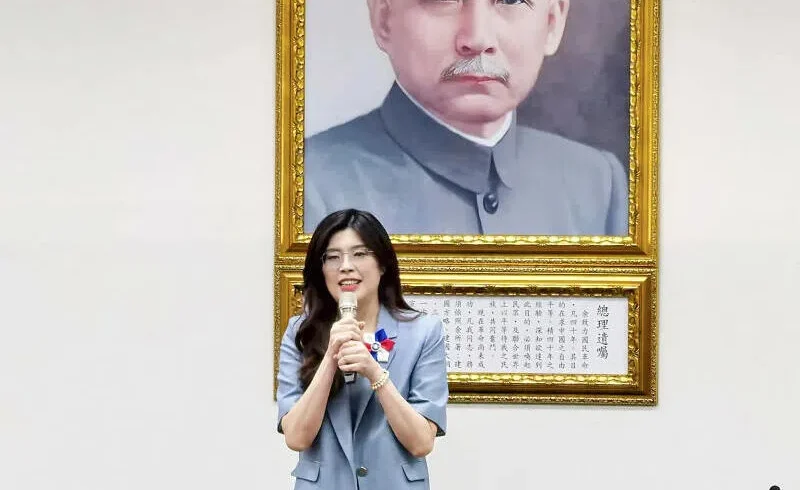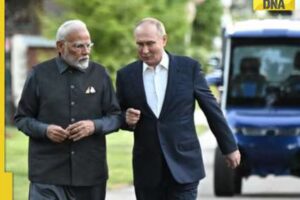
TAIPEI – Former lawmaker Cheng Li-wun has been elected the new leader of Taiwan’s largest opposition party, the Kuomintang (KMT) – a role crucial to potentially steering the party back to power in the island’s 2028 presidential race.
The 130-year-old KMT – the oldest in East Asia – has lost three straight presidential elections to the ruling Democratic Progressive Party (DPP) since 2016, but analysts told The Straits Times that its supporters now see a glimmer of hope in a new chairperson.
“Cheng represents fresh energy and has a fighting spirit, so she is seen as capable of taking the KMT into a new era,” said Dr Philip Yang, managing director of the Taipei Forum think-tank.
“The KMT must now really think about how it will reach a wider base of supporters, particularly among the youth, moderate voters and women,” he added.
The outspoken Ms Cheng, 55, who positioned herself as a reformist to turn the KMT from a “flock of sheep” into a “pack of lions”, defeated five other candidates in a crowded race.
She won the party race on Oct 18 with 65,122 votes, or 50.15 per cent of the vote, beating out former Taipei mayor Hau Lung-pin (2006-2014), who took 35.85 per cent.
Having begun her political career in the DPP, Ms Cheng is not considered part of the KMT’s traditional elite. She was widely seen as a dark-horse contender, especially when compared with her closest competitor.
While the 73-year-old Mr Hau, who previously also served as environment minister from 2001 to 2003, has more political experience, he was also seen as a representative of the party’s old guard.
“Cheng represents the party’s change and aspirations,” Dr Yang noted.
Ms Cheng is only the second woman to be elected KMT chief, after Ms Hung Hsiu-chu, who served from 2016 to 2017.
A former two-term lawmaker and a vocal TV political commentator, Ms Cheng maintained a clear lead in the Oct 18 vote as soon as counting began at 4pm. Two hours later, incumbent party chairman Eric Chu told a news conference that he had already extended his congratulations to her, even before the tally had been finalised.
Accepting the win later, Ms Cheng said at the same event that she would make the KMT better and stronger in the future.
“The KMT will shoulder its responsibilities and actively serve as a peacemaker for regional peace,” she added in a speech as she took a deep bow. Ms Cheng is scheduled to take office on Nov 1.
Despite not being the ruling party, the KMT maintains strong political influence in Taiwan as it holds enough seats in the legislature to form a majority bloc with its ally, the smaller Taiwan People’s Party.
This means that Ms Cheng could influence how Taiwan deals with an increasingly bellicose Beijing, which views the island as its own territory.
“She is seen as very pro-China, so that will likely have some impact on legislative issues such as Taiwan’s defence budget,” said Associate Professor Chen Shih-min, a political science analyst from National Taiwan University.
“She is a vocal critic of Lai’s plans to significantly raise the defence budget, which would put the party at odds with the US as Washington wants to see Taipei spend more on its own defence,” Prof Chen told ST, referring to President Lai Ching-te.
Mr Lai has repeatedly pledged to raise Taiwan’s defence spending to exceed 3 per cent of Taiwan’s GDP in 2026, and cross the 5 per cent threshold by 2030. Currently, Taiwan spends about 2.45 per cent of its economic output on its military.
During her campaign, Ms Cheng had declared that she hopes to make Taiwanese “proud to be Chinese”. She also said that she would be happy to meet Chinese President Xi Jinping.
Prof Chen said: “Perhaps, she is only saying all these things to appeal to the majority of the party’s voters, who are Beijing-friendly. But whether she will be able to convince the rest of Taiwan on such views is a different matter.”
Chinese state news agency Xinhua reported that Ms Cheng had been elected the new chairperson of the Chinese Kuomintang party.
The KMT has traditionally favoured warmer ties with China, in the belief that a closer relationship would be beneficial to Taiwan’s stability and economy.
But as Beijing has significantly ramped up its military and political pressures against the island to assert its sovereignty claim, this has made it challenging for the party to
win over the hearts and minds of young Taiwanese.
“We will have to see how Cheng takes the party forward – she has to convince people that even as she seeks closer ties, she will not sacrifice Taiwan’s interests,” said Prof Chen.
TaiwanChinaCross-strait tiesElections





